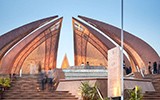Islamic Republic of Pakistan is the federation of 5 provinces Punjab, Sindh, KPK, Balochistan & ...
Living in Pakistan guide for expats
All the information you need to relocate and live in Pakistan.
Our selection of articles for expatriation in Pakistan
The self finance scheme for international students in professional institutes of All over the Pakistan was ...
About Pakistan
Stone tools have been discovered in various parts of Pakistan, indicating that a few ancient cultures have originated from the regions that today form part of the country, such as the Indus Valley Civilisation, one of the oldest in the world. Other cultures that occupied and invaded the region we now call Pakistan include the Vedic Civilisation, the Persian Achaemenid Empire, Alexander the Great's empire, and many more. During the British Empire rule in the 19th century, there were increasing conflicts between Muslims and Hindus, leading to racial tension and violence in India, which eventually led to revolutionary fights for an all-muslim nation. Pakistan separated from India and became its own independent country in 1947, the only country in the world that was created to become a Muslim country. During the partition, about 4.7 millions of Hindus and Sikhs moved from Pakistan into India, and about 6.5 millions Muslim migrated from India to Pakistan. That migration is known to be the largest mass migration that ever occurred.
Pakistan covers an area of over 795, 000 sq km, and has three distinct geographic regions: the highlands in the north, the Indus River plain, and the Balochistan plateau in the southern region. Consequently, Pakistan is very diverse in its landscapes, which include everything from plains, to dry and hot deserts, to forests, lakes, and snow-capped mountains. This means that the climate also varies from dry and hot, temperate in certain regions, and very cold in the north. There is also a large variety of fauna and flora.
Certain parts of Pakistan lie on the tectonic plate, meaning that they are prone to severe earthquakes, particularly in the north and west. Heavy rains during the summer months sometimes lead to flooding along the Indus Valley. Deforestation, hunting, and pollution are some of the problems contributing to adverse impacts on the natural ecosystem, and the steps taken to address those issues include the creation of game reserves, wildlife sanctuaries, and protection of specific areas.
With a population of around 205 million, the majority of them speaks Urdu, the national language. English is also widely spoken, and is also considered an official language along with Urdu, although there are an additional 60 or more provincial languages as well. Almost half of the population is Punjabi, and the other ethnic groups are comprised of Pashtuns, Sindhis, Saraikis, Muhajirs, and Balochs.
The official religion is Islam, practised by over 95% of the population. Subsequently, cultural etiquette and social norms reflect an Islamic influence, which can be seen in the dress code for instance, where both men and women dress modestly. Traditions are very important in Pakistan, and even as fashion evolves, the modern clothing still reflects a mixture of traditional and contemporary styles.
Cuisine in Pakistan is a mixture of British, Central Asian, and Middle Eastern influences, but with heavy use of spices and herbs such as garlic, turmeric, chili, and ginger. A regular dish would generally include curry and lentils, served with rice or roti. Lassi is a popular drink, made with yogurt and spices. Tea is part of Pakistan's culture, and is consumed on a daily basis. Halwa is a popular and traditional sweet dish, offered in many varieties.
Latest job offers in Pakistan










